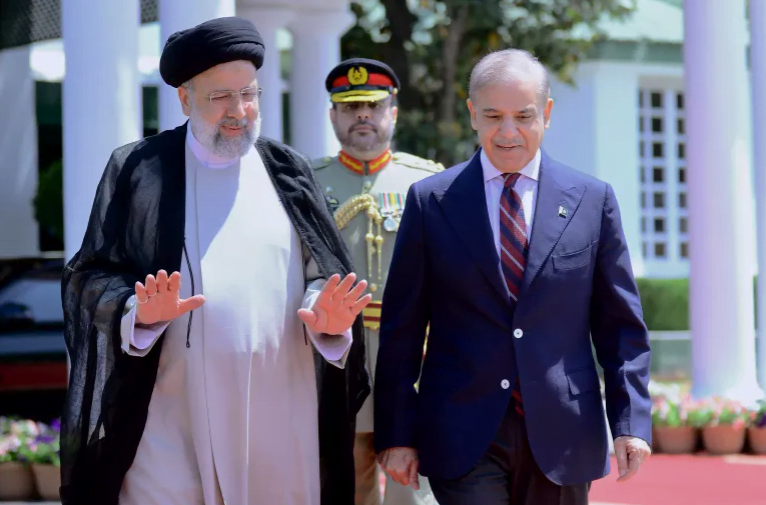Ebrahim Raisi’s Strategic Visit to Pakistan
Iran’s President Ebrahim Raisi is making a three-day visit to Pakistan to strengthen regional and bilateral ties amid rising tensions between Iran and Israel. This visit marks an opportunity for both nations to address their economic, energy, and border relations, aiming to improve cooperation and collaboration.
The Purpose of Raisi’s Visit
Raisi’s trip focuses on advancing economic, border, and energy ties with Pakistan. The visit aims to discuss various issues such as trade, commerce, energy, and border management, as stated by the Iranian presidential office. Both countries share Ebrahim Raisi an interest in fostering a stable and mutually beneficial relationship.
Agenda and Meetings
During his visit, Raisi is scheduled to meet with Prime Minister Shehbaz Sharif and other top Pakistani officials, including General Asim Munir, the head of Pakistan’s military. His itinerary includes visits to major cities like Lahore and Karachi, emphasizing the importance of strengthening trade and bilateral ties.
Status of Iran-Pakistan Relations
The relationship between Iran and Pakistan has been historically fraught with tensions, particularly along the border. In January, Iran carried out airstrikes across Ebrahim Raisi the border into Pakistan, targeting alleged militant bases, resulting in Pakistani retaliation. Both countries have since sought to de-escalate the situation and work towards confronting the challenges in the border region.
Importance of the Iran-Pakistan Relationship
Maintaining a strong and stable relationship with Iran is vital for Pakistan due to its strategic location and ongoing challenges with other neighboring countries. Ebrahim Raisi A robust partnership between the two nations can foster regional stability and improve economic opportunities for both sides.
Trade and Energy
Iran and Pakistan currently engage in trade worth over $2 billion. Informal trade exists, including the exchange of liquefied petroleum gas (LPG), crude oil, and electricity from Iran to Pakistan’s Balochistan province. The potential for further trade expansion and energy cooperation remains high.
Bilateral Initiatives
Recent initiatives such as the opening of a border market at the Mand-Pishin border crossing illustrate the countries’ willingness to enhance trade and cooperation. These efforts aim to establish a more stable and integrated relationship between the two nations.
Iran-Pakistan Pipeline Project
The proposed gas pipeline project to transport Iranian natural gas to Pakistan faces challenges due to opposition from the United States and its sanctions on Iran. Despite this, the pipeline remains a potential area of discussion during Raisi’s visit, reflecting the ongoing effort to expand energy cooperation.
Response to Iran-Israel Tensions
In light of recent tensions between Iran and Israel, Pakistan’s Foreign Ministry has called for de-escalation and a return to diplomacy. Ebrahim Raisi Pakistan stresses the importance of international efforts to prevent further hostilities and restore peace in the region.
Conclusion
President Raisi’s visit to Pakistan represents a significant step towards improving relations and addressing key issues between the two countries. By focusing on economic, border, and energy ties, both nations aim to foster a more stable and cooperative relationship for the benefit of their peoples and the broader region.
Unprecedented Attack: Iran Launches Over 200 Missiles and Drones at Israel
FAQs
- What are the main objectives of Raisi’s visit to Pakistan?
- Raisi aims to strengthen economic, border, and energy ties with Pakistan, as well as to discuss various issues such as trade, commerce, and border management.
- How has the Iran-Pakistan relationship evolved over time?
- The relationship has faced historical tensions, Ebrahim Raisi particularly along the border, but both nations have sought to de-escalate conflicts and work towards mutual cooperation.
- What economic opportunities exist between the two countries?
- Opportunities include increased trade, particularly in informal sectors such as LPG and crude oil. Additionally, there is potential for further energy cooperation and border market development.
- How does Pakistan respond to tensions in the Middle East?
- Pakistan’s Foreign Ministry calls for de-escalation and a return to diplomacy, emphasizing the need for international efforts to prevent further hostilities and restore peace.
- What challenges exist in the Iran-Pakistan relationship?
- Challenges include border tensions, regional Ebrahim Raisi conflicts, and the impact of US sanctions on Iran, particularly concerning the proposed gas pipeline project.
